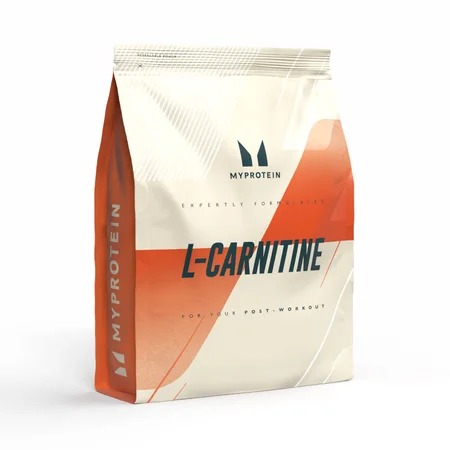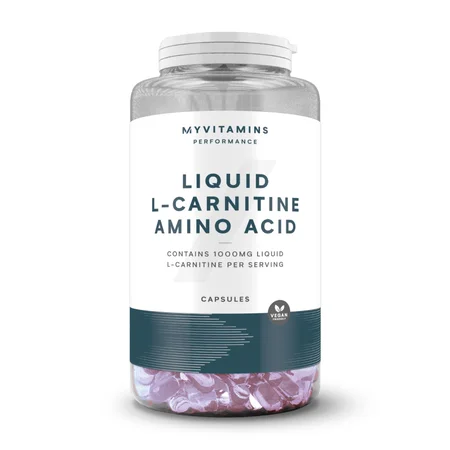L-Carnitine | What Is It? Benefits, Dosage & When To Take

L-carnitine is another supplement that sounds crazy confusing, so we’re here to break apart the fact from the fiction. So, what exactly is this interesting supplement?
It’s been used by athletes all around the world for its fat-burning capabilities, since it could potentially optimise how your body uses fat as a fuel source, leading to greater exercise performance.3 L-carnitine is a popular supplement for weight loss and fat burning purposes, and when taken correctly, could be a great addition to your training regime. Let’s find out more…

What is L-carnitine?
It's a non-essential amino-acid-like compound, meaning it’s produced in the body naturally.
You can get a certain amount of L-carnitine from your diet, as it’s found in foods such as red meat — typically the redder the meat, the better. Plant sources such as avocado and soybean contain small amounts too. Supplements should be consumed alongside a healthy diet, but are often recommended to anyone who struggles to get enough of a certain nutrient in their diet.5
L-carnitine is responsible for transporting long-chain fatty acids to your cells’ mitochondria, where energy is then produced as the fat is oxidised and used for fuel. More than 95% of the body’s L-carnitine stores are found in skeletal muscle (muscle which is connected to your skeleton), along with trace amounts in the liver and blood.6
Benefits of L-carnitine
1. Weight Loss
It's been theorised that L-carnitine could help your body to produce energy by utilising the body’s fat stores, allowing you to work out for longer and ultimately aiding in fat loss. Evidence suggests it may promote weight loss by increasing calorie expenditure.6 Taking it daily has been proven to increase the blood and muscular concentrations of this amino acid-like compound, which could enhance fat metabolism as a result with increased muscle carnitine concentrations.6
2. Exercise Performance & Recovery
Given its potential fat-burning capabilities, it's thought that L-carnitine optimises how your body uses fat for fuel, allowing you to exercise for longer.7 Some research has also found that 3 weeks’ supplementation with an L-carnitine supplement reduces muscle damage from high intensity exercise bouts.7
Supplementing with L-carnitine could also play an important role in recovery from strenuous exercise, with suggested doses of 2-4g daily to optimise results.6 There's initial evidence that this could lead to a reduction in various markers of metabolic stress and muscle soreness which is replicated in many studies. However, research is still limited and further studies are needed to enhance the scientific evidence for l-carnitine supplementation.2
How Does L-Carnitine Work?
When you exercise, thousands of biochemical reactions are taking place inside your body. One of these is the action of your enzymes starting to break down stored fat into fatty acids and glycerol, a sugar alcohol. These are then used as fuel throughout exercise.
Studies have theorised that L-carnitine is a compound that plays an important role in this process of fat metabolism as its key role is to transport the long-chain fatty acids across the inner membrane. These fatty acids are thought to be the main energy sources used during low- to moderate intensity exercise.2

Types of L-carnitine and Their Uses
The two main variations of L-carnitine that are supplemented in the diet are L-carnitine tartrate and acetyl L-carnitine.
1. L-carnitine Tartrate
L-carnitine Tartrate is one of the most common forms of L-carnitine found in sports nutrition supplements due to its rapid absorption rate.9 It’s created in the body from the amino acids lysine and methionine and is mainly synthesised in the liver and kidneys before being transported for use in other tissues in the body.
L-Carnitine Tartrate is found in its highest levels in tissues that use fatty acids as the main fuel source, such as the skeletal and cardiac muscles. It should be taken in conjunction with a healthy, balanced diet and exercise regime.3
2. Acetyl L-carnitine (ALCAR)
Acetyl L-carnitine is created in the body from the amino acids lysine and methionine. ALCAR has an acetyl group attached to the carnitine molecule. This allows it to pass through the blood-brain barrier making it the most bio-available, and thus most easily absorbed, form.
ALCAR is ideal for athletes and active people who take part in regular exercise or anyone looking for an easy-to-consume source of L-carnitine that can be taken throughout the day.3

When to take L-carnitine
Studies have observed that l-carnitine, when taken with 80g carbohydrates, has positive effects, as a 20% increase in muscle carnitine content was seen with 12 weeks of supplementation.8
The combination of l-carnitine and carbohydrates prevented an 18% increase in body fat mass accumulation associated with taking only carbohydrate supplementation in healthy young males.6
Taking this supplement with a decent amount of fast-acting carbohydrates may be of greater benefit as insulin, a hormone which is released when you consume carbohydrates, stimulates carnitine transportation into skeletal muscle (i.e. 60g of dextrose or maltodextrin).8
Whilst there’s some evidence to suggest that L-carnitine can take effect approximately 30-45 minutes after consumption, the “before or after workout” dilemma ultimately doesn’t seem to be the most important factor when considering supplementing with it.6 Rather, take it daily for a few weeks to increase carnitine stores and you should be able to see some impactful results.6

Dosage – How much do you take?
Studies suggest varying doses for each form of L-carnitine for best results, the following is deemed optimal for each form of carnitine:5
Acetyl-L-Carnitine: 600–2,500 mg per day. L-Carnitine L-Tartrate: 1,000–4,000 mg per day. Propionyl-L-Carnitine: 1,000–4,000 mg per day.
Take Home Message
It has been suggested that L-carnitine has the ability to move more fatty acids into your cells to be burnt for energy, making it an effective performance enhancer, and it may also be beneficial for fat burning and weight loss.
While there are some positive results with l-carnitine supplementation, it must be considered that overall scientific evidence is lacking.
The various forms of L-carnitine are perfect supplements for people who don’t easily acquire it from natural food sources as a part of their normal diet.
FAQ
When is the best time to take l-carnitine?
It is reommended to take l-carnitine with fast acting carbohydrates. Whether it is taken pre or post workout isn't considered an important factor.
What is l-carnitine?
L-Carnitine is a non-essential amino-acid-like compound, responsible for transporting long-chain fatty acids to your cell's mitochondria, where energy is produced from the fat's oxidisation.
What are the benefits of l-carnitine?
Evidence suggests that l-carnitine may promote fat loss and optimise exercise performance and recovery.
How does l-carnitine work?
L-Carnitine transports fatty acids across the inner membrane. These fatty acids are thought to be the main energy source duing low to medium intensity exercise.
What types of L-Carnitine are there?
L-Carnitine Tartrate is a common form found in sports supplements due to its high absorbtion rate. Acetyl L-Carnitine is the most easily absorbed form, making nit ideal for athletes and active people.











